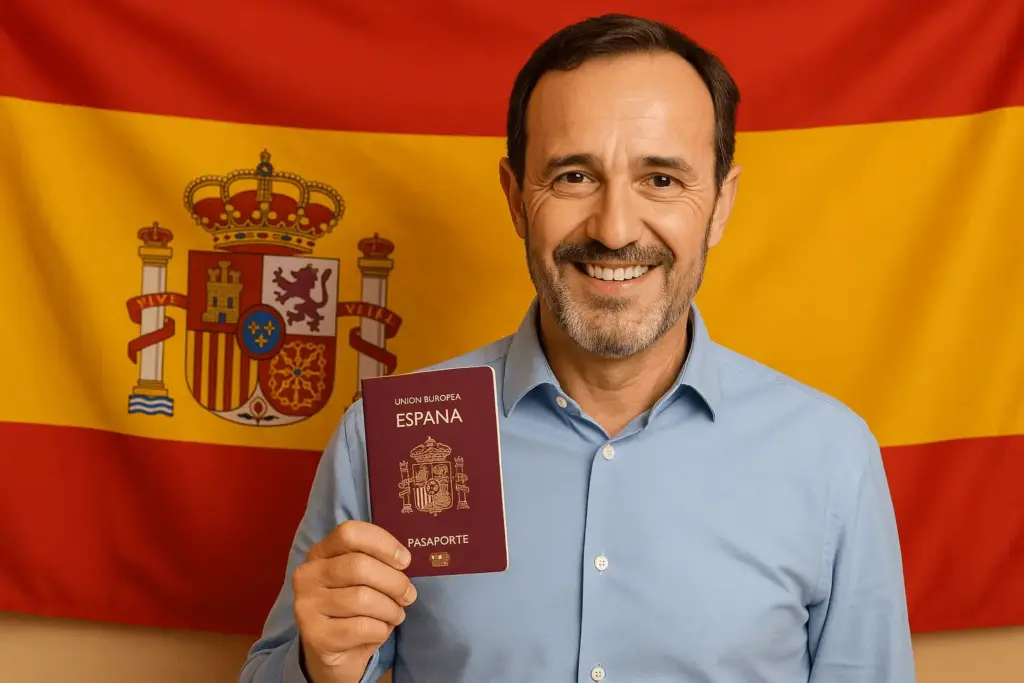A student visa and a Work visa are two different things. If you are a foreign student who wants to work after the studies, you may have heard or thought about how to switch your student visa to a work visa in Spain. In this article, we are going to explain how exactly this works, what alternatives you have, and the advantages and challenges that come with each way.
Here you can find a summary of the article and the links to go directly to the answer you are looking for:
Contents:
- From student visa to work visa in Spain All you need to know
- Work on Payroll – work permit as an employee
- Highly qualified visa or Highly skilled professional visa
- Regular self-employed work visa
- The Entrepreneur visa/ Start-up visa
- Challenges and Advantages of each Option
- Job-Seekers visa
- Conclusion

Yes, you can work in Spain on a student visa IF your study course has an official recognition of the Spanish government and fits into certain categories.
If you have already completed your education, you will need to switch your student Visa to a work permit. (There are several options for this, which we will describe shortly.)
However, if you are still a student, you should be aware that you can work with your student visa while studying.
For student residency cards issued after August 16, 2022 (the day the adjustment went into effect): they carry the term “autoriza a trabajar” as proof that the card is adequate to complete these 30 hours. This means that you can work up to 30 hours a week from anywhere in Spain if your lecture hours do not conflict with your work schedule. This applies only if you are studying a course that has official recognition of the Spanish authorities and fits into one of the below categories:
- higher education,
- regulated training for employment,
- training leading to obtaining a certificate of professional competence, or
- training leading to obtaining a certificate of technical aptitude or professional qualification required for the pursuit of a specific occupation.
Those whose cards were issued before August 16, 2022, or if your course does not fit into the above description, must go through a compatibility procedure to work while studying.
You can only work in Spain while on a student visa without applying for any specific permission IF your TIE card has the words “autoriza a trabajar“.
Yes, your student visa can be converted to a work permit. Indeed, this is a common reason why a lot of non-EU nationals choose to come to Spain on a student visa: studying in Spain can open opportunities to find a good job later, and it tends to be easier to get a residence and work permit when you have completed your studies in Spain (instead of directly applying for a work permit from abroad).
Therefore, if you are about to graduate or have already completed your studies but want to stay in Spain to work, you have different options to transition your student visa into a work permit. We are going to explore these different options, but here are first some general requirements and challenges:
- You have completed your studies, research, training, or internship in Spain.
- You are not prohibited from entering Spain and lack criminal or police records in Spain or previous countries of residence for the last five years.
There are multiple ways to switch your student visa to a work visa in Spain, which we will explain to you step by step briefly below:
- It can be hard and difficult to decide which way is the best for you.
- Navigating through the legal and bureaucratic processes: Spain is not the easiest country to get a visa in, and the process requires a lot of patience.
- Understanding the requirements: sometimes it can be difficult to exactly know, what is needed from you and if your circumstances fit the criteria.
- Ensuring that your documentation is correct, prepared, and submitted.
Because of these challenges, switching your visa may appear difficult. But it’s not! Here’s a quick guide to help you determine which route to take and what you’ll need for it.

If you want to stay in Spain and you already have a student visa, you can switch that visa to a work permit.
- You need a Job offer from a company.
- The Application must be made to the corresponding Immigration office of your region (e.g., in Barcelona you would have to submit the application to the Department of Employment of the Generalitat de Barcelona, but in Madrid, you must file it to the Immigration office of Madrid).
- All these documents that follow:
- The Form Modelo EX-03, completed by the company you have the job offer from.
- A copy of your valid passport (all pages).
- A certificate of completion and passing your studies (certificado de aprovechamiento) from your school/university.
- Copies of relevant qualifications for your profession.
- If you are hired by an individual: a copy of their NIF/NIE and consent for the government to check their details.
- If hired by a company: a copy of the company’s NIF, articles of incorporation (escritura), NIF or NIE of the owner, a signed work contract, and the company’s tax return to demonstrate solvency.
- You must submit all required documents at the corresponding Oficina de extranjería.
- Make sure that you submit the documents 60 days before or 90 days after your student visa expires.
- Fill the Modelo 790 código 052, epígrafe 2.1.
- The company must pay Modelo 790 código 062, epígrafe 1,1 , and pay the tax at a bank or ATM .
- Once approved, your employer has one month to register you in Social Security.
- After registering in Social Security, you have one month to request your new TIE.
The Highly Qualified visa, also known as the Highly Skilled Professional visa, is a work permit that allows citizens from outside the European Union to live and work in Spain lawfully, provided they get a job offer in a Spanish company in a qualified or technical position, or as a manager leading people.
You can find more details here.
If you are a foreign student with a higher education and a job offer as a manager or in a technical position in Spain and want to stay in Spain after your studies, this visa switch Option might be for you.
It applies for any person who has the necessary skills and qualifications, not necessarily to those who finished their studies in Spain, but if you are currently on a student visa and get such a job offer, you can file your application at any time while being legally present in Spain.
- You must have completed a university degree, master’s, or Ph.D. or a relevant professional experience of at least 3 years.
- A Job offer for a manager or in a technical position.
- A salary of about 41,000 Euros per year per expert and 61,000 for managers (always double-check the amount applicable at the moment of filing your application).
For this type of work permit, you must apply to the Unit of Large Companies and Strategic Sectors, which will evaluate the job offer and your skills.
Many jobs, despite surpassing the income requirement, are not considered eligible for the UGE-CE. That is why it is critical to do a thorough evaluation of your application form and documentation.
If you want to work for yourself and be an independent contractor for clients and companies, you can change your student visa in Spain into a self-employed work permit. In Spanish, this type of visa is called “por cuenta propia”. You are then working as an “autónomo”. However, if you want to choose this path, you need to pay attention to a few things and among other things, present a business plan, which can be tricky.
Present a detailed business plan:
- The business plan should clearly outline the activity of your company, financial projections, relevant qualifications, and experience.
- Here it is important to be realistic. Don’t strive to impress the government, just to get their approval. If you won’t be able to produce a thousand jobs, don’t make such a bold claim. Of course, the government appreciates it when you want to support the Spanish economy but plans that are too ambitious and not realistic tend to be rarely accepted.
- You need to fill out the Form Modelo EX-07.
- You need a copy of your valid passport.
- A certificate of completion and passing your studies (certificado de aprovechamiento) from your school.
- You also need copies of relevant qualifications for your profession.
- Your business plan and documents demonstrating financial capacity to establish a business.
- Once you have every document ready, you can submit your application at the corresponding Immigration office of your province.
- Pay Modelo 790 código 052, epígrafe 2.1.
- Pay Modelo 790 código 062, epígrafe 1.5.
- After the approval, you have one month to register in Social Security and request your new TIE (residency card).
If you are a non-EU national with a student visa, who wants to start their own company, you might wonder if it is better to apply for an entrepreneur visa instead of a regular self-employment visa to get your work permit in Spain. With this visa, it is still possible to start your own business and get a residency.
You can get more details here.
- For your business project to get accepted, it has to have a very big potential to grow and be innovative and it also requires involving an important technological component.
- The government is stricter and more selective with the application of the Entrepreneur visa.
The process of obtaining a start-up visa can be difficult to understand. It does matter if you have been studying in Spain before, the process is the same as if you would apply for it as a non-student. You can find out how this works here.
Work on Payroll
You need to have a job offer from a company. Sometimes this can be challenging, depending on the labor Market.
You do not need to worry about other things, including business ideas or the requirement of finances if you already have a job offer from a corporation. It can therefore be less stressful.
Highly qualified visa or Highly skilled professional visa
Not all job positions qualify, even if their salary is over 41.000 Euros per year.
There is a lot of competition for highly qualified positions.
The Application processing time is faster than in comparison to other work permit applications.
Opportunity to leverage skills and knowledge gained during training.
With the switch to this work visa, you can further enhance your professional skills and development and contribute to the Spanish workforce.
You have the potential for a higher salary.
Self-employed work-visa
Due to the requirement of a detailed business plan, this can be time-consuming.
Your business plan needs to be convincing and realistic, sometimes this can be hard to master.
You have the freedom of working for yourself or with independent contractors, this gives you a lot of scope and liberty.
The Entrepreneur visa / Start-up visa
Due to the strict and selective Process of the government, it is difficult to get this visa.
The Government only accepts concepts that have a high growth potential, are truly innovative, and include a significant technological component.
If you want to renew that visa, there are higher expectations for the project your company needs to be operating as expected. If that is not the case, likely, the renewal will not be accepted.
With this visa, you can establish your firm and obtain residency and there is no minimum need for the time you have already spent in Spain. In addition, you can benefit from significant tax reductions for your business.
If you are still waiting to receive a job offer from a company after finishing your education or are unsure which career route you want to take, there is another alternative for you. This option allows you to discover a job and explore where you wish to work. Of course, this is not given easily to everyone, so make sure your profile meets the requirements.
To whom does it apply?
- For students who have completed their studies in Spain and are actively seeking employment, there is an option to apply for a one-year residence permit extension. This allows students to stay in Spain while they continue their job search.
- Completed studies at an eligible university or education institution.
- Confirmation of active job search and effects to secure employment.
- Compliance with the regulations and application processes set by the Spanish immigration authorities.
- Submitting the necessary documentation to the corresponding Immigration office.
- Prepare all required documents accurately and meet the required deadlines.
- Working with an immigration lawyer can be very useful.
Whichever route you choose, converting from a student visa to a work visa in Spain is not such a straightforward process and can get tricky. It requires a formal application, completing additional documents, and a significant commitment of time, focused effort, and relevant expertise.
Don’t hesitate to get in touch with us through the form below if you need legal assistance from a knowledgeable team of immigration lawyers. We will assess your circumstances, determine which route is the best for you, and take care of the paperwork.
This article is written in collaboration with Mara Pelzer, a member of the Legal Support Team at Klev&Vera.




